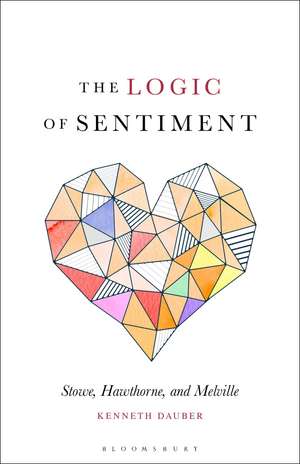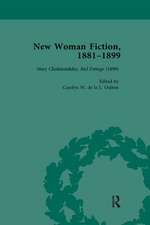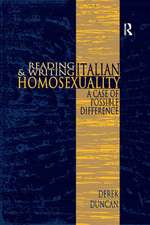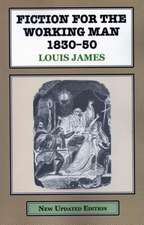The Logic of Sentiment: Stowe, Hawthorne, and Melville
Autor Professor or Dr. Kenneth Dauberen Limba Engleză Paperback – 13 noi 2019
| Toate formatele și edițiile | Preț | Express |
|---|---|---|
| Paperback (1) | 163.24 lei 3-5 săpt. | |
| Bloomsbury Publishing – 13 noi 2019 | 163.24 lei 3-5 săpt. | |
| Hardback (1) | 495.10 lei 6-8 săpt. | |
| Bloomsbury Publishing – 13 noi 2019 | 495.10 lei 6-8 săpt. |
Preț: 163.24 lei
Preț vechi: 214.04 lei
-24% Nou
Puncte Express: 245
Preț estimativ în valută:
31.24€ • 32.61$ • 25.85£
31.24€ • 32.61$ • 25.85£
Carte disponibilă
Livrare economică 14-28 martie
Preluare comenzi: 021 569.72.76
Specificații
ISBN-13: 9781501357367
ISBN-10: 1501357360
Pagini: 176
Dimensiuni: 140 x 216 mm
Greutate: 0.2 kg
Editura: Bloomsbury Publishing
Colecția Bloomsbury Academic
Locul publicării:New York, United States
ISBN-10: 1501357360
Pagini: 176
Dimensiuni: 140 x 216 mm
Greutate: 0.2 kg
Editura: Bloomsbury Publishing
Colecția Bloomsbury Academic
Locul publicării:New York, United States
Caracteristici
Sweeping reexamination of American literature that deals with canonical novels such as Uncle Tom's Cabin, The House of the Seven Gables, and Pierre and offers new perspectives on major literary movements, including realism, modernism, and postmodernism
Notă biografică
Kenneth Dauber is Professor of English at SUNY Buffalo, USA. He is the author of three books, including The Idea of Authorship in America (1990) and Rediscovering Hawthorne (1977), and is co-editor, with Walter Jost, of Ordinary Language Criticism (2003).
Cuprins
Introduction 1. Two Senses of Knowing: Uncle Tom's Cabin2. The Politics of Representation: The House of the Seven Gables 3. For Love Alone: PierreNotes Index
Recenzii
The word logic is not often used with the word sentiment. In connecting the two, Dauber (SUNY, Buffalo) engages with three literary texts: Harriet Beecher Stowe's Uncle Tom's Cabin (1852), Nathaniel Hawthorne's The House of Seven Gables (1851), and Herman Melville's Pierre (1852). In his philosophical analysis, Dauber makes deep inquiries into how 'out of the heart of sentimentality's repression of skepticism, the three novels begin the process of embracing it, moving toward the reconstruction of community on the ground of skepticism' (p. 9). The chapter on Stowe's landmark novel is the most bracing. In it, Dauber questions generic contours that readers have taken for granted, probing, for example, how Stowe 'reveals the way in which realism is a kind of sentimentality as well, translating the subjectivity of insidedness into outsidedness so effectively that it is simply never noticed as such' (p. 35). Further, discussion of Stowe reveals that 'knowing' is objective and realism is thus 'sentimentality unsentimentally articulated' (p. 46). The discussion of the character Augustine St. Clare as a skeptic is particularly useful; Dauber reads St. Clare 'not as one who does not know, but [as one] whose knowing no longer speaks to him. He knows, but has no feeling for what he knows' (p. 48). Summing Up: Recommended. Graduate students, researchers, faculty.
In The Logic of Sentiment, Kenneth Dauber both redefines the American sentimental tradition as the fear of skepticism--the insistence that to be loved the other must be known--and expands the reach of philosophically grounded literary criticism beyond its usual questions, authors, and objects. With this, he proposes new ways of thinking about affect and sociality, arguing that only a wayward love beyond what we know of each other can found community.
In this lovingly dubious thought experiment, Kenneth Dauber discerns the skeptic as the figure to whom Stowe, Hawthorne, and Melville must deny entry to the sentimental communities they have conjured in three iconic 19th-century novels. Reading these prototypical sentimental novels from the point of view of the skeptic, Dauber identifies skepticism's aversion as what sustains the communal logics of sentiment; Dauber also hails skepticism's embrace as the unacknowledged heart of the genre.
This excellent project offers readers of literature and students of philosophic thinking a genuinely different approach to cultural difference. In his philosophic reading of the rise of the sentimental novel, Dauber juxtaposes 'knowing' and 'feeling' and 'loving' in myriad tensions and surprising kinships, each one of them careful, thoughtful, informed, and non-dogmatic--a desirable kind of study at any time, but all the more rare, and valuable, in our own.
In The Logic of Sentiment, Kenneth Dauber both redefines the American sentimental tradition as the fear of skepticism--the insistence that to be loved the other must be known--and expands the reach of philosophically grounded literary criticism beyond its usual questions, authors, and objects. With this, he proposes new ways of thinking about affect and sociality, arguing that only a wayward love beyond what we know of each other can found community.
In this lovingly dubious thought experiment, Kenneth Dauber discerns the skeptic as the figure to whom Stowe, Hawthorne, and Melville must deny entry to the sentimental communities they have conjured in three iconic 19th-century novels. Reading these prototypical sentimental novels from the point of view of the skeptic, Dauber identifies skepticism's aversion as what sustains the communal logics of sentiment; Dauber also hails skepticism's embrace as the unacknowledged heart of the genre.
This excellent project offers readers of literature and students of philosophic thinking a genuinely different approach to cultural difference. In his philosophic reading of the rise of the sentimental novel, Dauber juxtaposes 'knowing' and 'feeling' and 'loving' in myriad tensions and surprising kinships, each one of them careful, thoughtful, informed, and non-dogmatic--a desirable kind of study at any time, but all the more rare, and valuable, in our own.

























